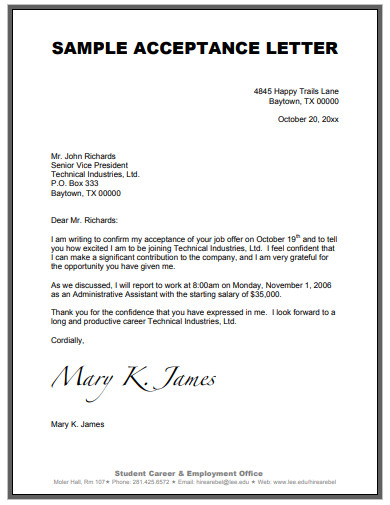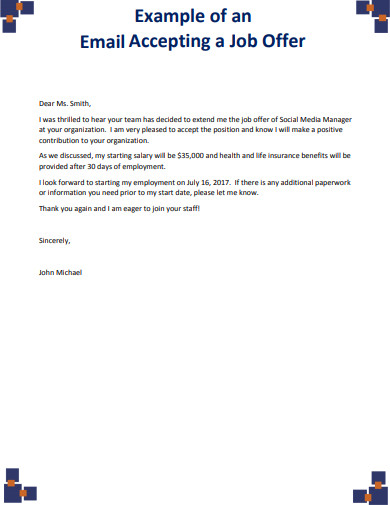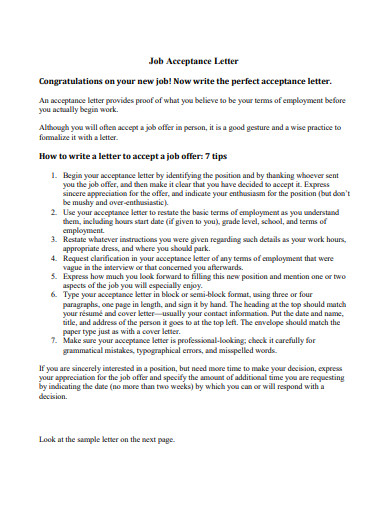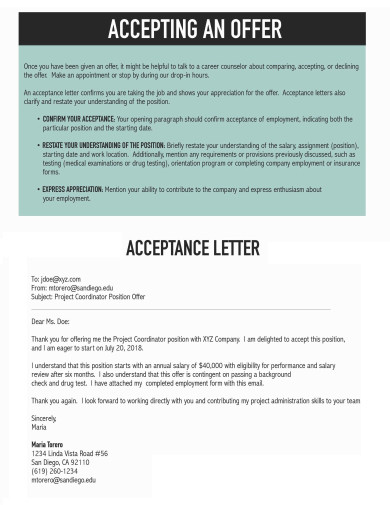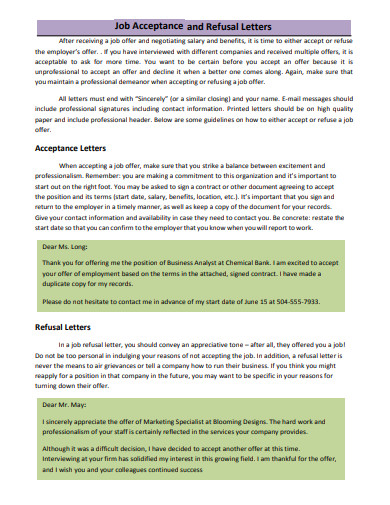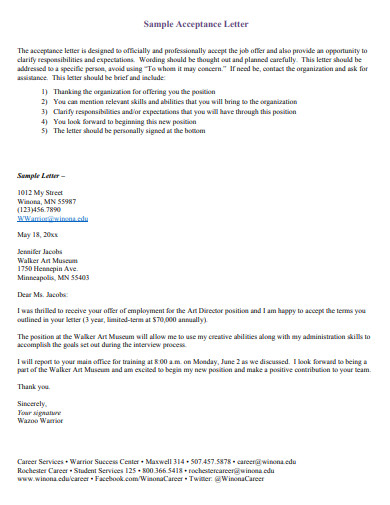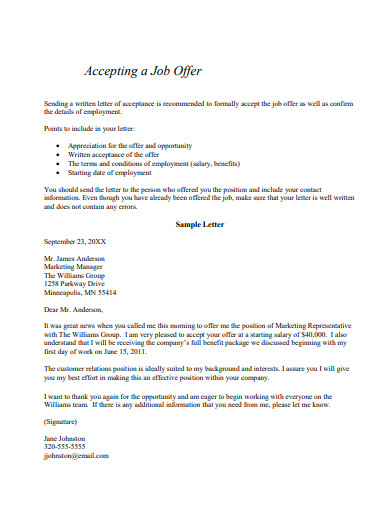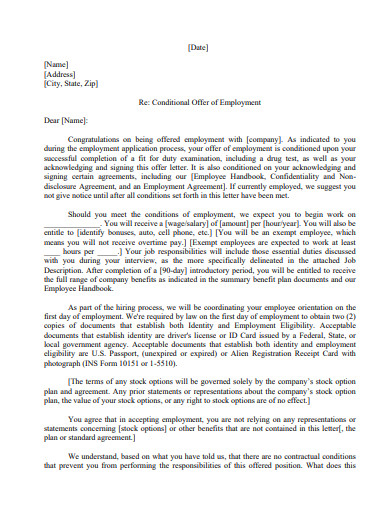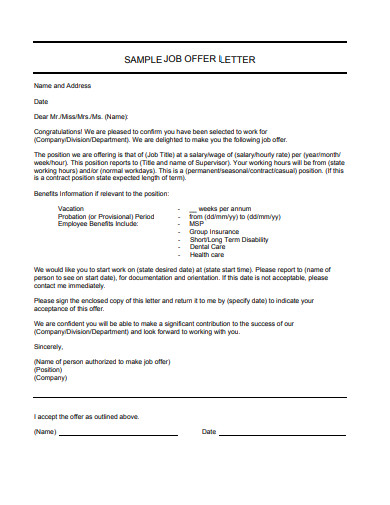10+ Job Offer Acceptance Letter Examples to Download
It gives out a nice feeling when you get a letter that states you got accepted by the company or the job that you applied for. Any person who knows what it is like would feel the same happy thrill for getting one letter of acceptance. This article will show you what a job offer acceptance letter looks like with 10+ examples, definitions and tips.
10+ Job Offer Acceptance Letter Examples
1. Free Job Offer Acceptance Letter Template
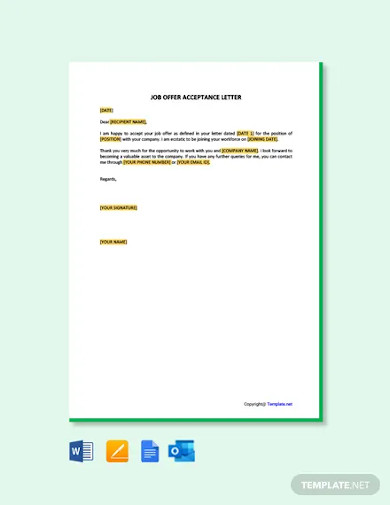
2. Free Job Offer Acceptance Letter
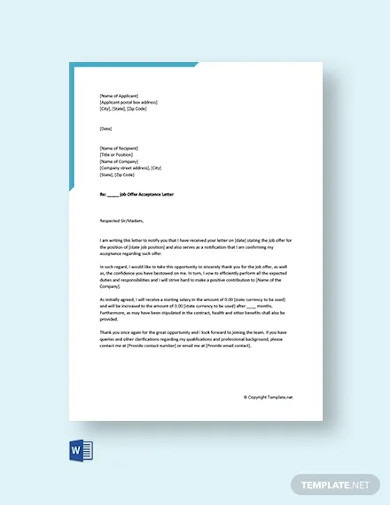
3. Sample Job Acceptance Letter
4. Accepting a Job Offer Template
5. Job Acceptance Letter Example
6. Job Offer Acceptance Letter Template
7. Job Offer Acceptance and Refusal Letter
8. Job Offer Acceptance Letter Sample
9. Basic Accepting Job Offer Letter
10. Job Offer Acceptance Letter in PDF
11. Simple Job Offer Acceptance Letter
Definition of Job Offer
A job offer is a formal invitation for a potential employee. A job offer is a formal proposal to work in a company or an organization. Job offers almost always contain the details of the employment. This includes the job description, position, responsibilities, salary, and the manager’s name.
Definition of Acceptance Letter
A type of letter that gives out a positive response to a job offer. A document that states a positive note to the employee. To notify the potential employee of the job offer and their decision to accept or decline. This type of letter should be kept straight to the point and should only conclude information that relates to accepting the offer.
Importance of Acceptance Letter
The importance of an acceptance letter is to merely acknowledge and accept the invitation of the job offer. Also there is one thing to look out for when you receive an acceptance letter. The invitation is always listed in the first sentence. This is seen as a positive response to the offer. It notifies the employee of a decision to accept the offer. The letter also talks about your future job title, salary and benefits.
Tips for Responding To a Job Acceptance Letter
Making a first impression when responding to the acceptance letter also matters. So as to not make it look like you are not interested or unprepared for this, here are 5 tips to help you on how to respond to the offer letter.
- Acknowledge the letter – The first thing you should do is to acknowledge the letter. This shows that you have received it and that you are happy to have received the letter. While doing so, be professional. Professionalism should be seen through your writing at all times.
- Say thank you – A thank you should be said after you acknowledge the letter. This is to simply say you are grateful for having received the letter.
- Be honest – Be honest. If you already accepted a different job, tell them. They will more likely understand than being lied to. This will tarnish your reputation as well. So be careful.
- Ask questions – Ask questions that are related to the job offer. Be professional when you start asking. Do not force it or say something rude if they could not give you the answers you ask for.
- State your appreciation for the opportunity – It is also advisable to state you appreciate the opportunity they have given. This shows professionalism and acceptance.
FAQs
Did I get a job if they simply told me?
A verbal offer does not guarantee that you got the job. Unless you are holding that important piece of paper in your hand. A verbal offer does not count as the fact that you have the job position you wanted.
What is a job offer?
A job offer is a formal invitation to accept the position you applied for.
How do you know if the job offer is tentative?
Often than not, employers would inform potential employees that the job offer is still tentative. If not, you may ask about it.
Job acceptance letters are what most people applying would look forward to seeing. Yet there are times we forget how to respond to these types of letters. We forget that this is still a professional letter and we must respond to it in a respectful and professional manner. By following the tips to answering the letter, you will have no problem.



